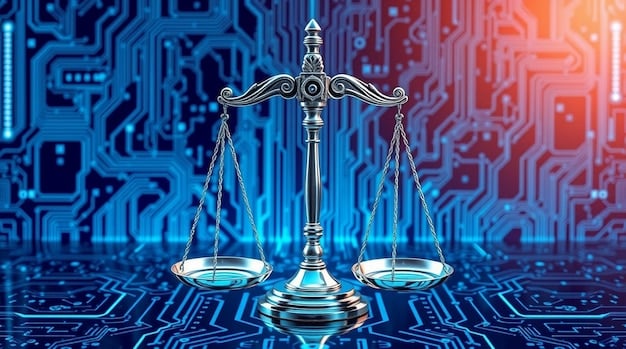Metaverse Risks & Benefits for US Society: A Deep Dive

The metaverse presents a complex duality for US society, offering significant opportunities for innovation, economy, and social connection while simultaneously posing substantial risks related to privacy, mental health, and digital divide.
The concept of the metaverse has quickly moved from the realm of science fiction to a tangible, albeit nascent, technological frontier. As this immersive digital universe begins to take shape, a crucial question emerges: What are the Potential Risks and Benefits of the Metaverse for US Society? Understanding this evolving landscape is paramount, as its development promises to reshape how Americans work, socialize, learn, and experience reality.
The Promise of the Metaverse: Economic Growth and Innovation
The metaverse is not just a game; it’s envisioned as a persistent, interconnected set of virtual spaces where users can interact with each other, digital objects, and AI-powered agents in real-time. This dynamic environment could unlock unprecedented economic opportunities and drive significant technological innovation across various sectors within US society.
One of the most evident benefits lies in the creation of new digital economies. In these virtual worlds, goods and services can be bought, sold, and traded, creating new markets and job roles that do not exist in the physical world. Consider the emergence of virtual real estate, digital fashion, and unique non-fungible tokens (NFTs) as examples of nascent economic activity.
New Job Markets and Skills
The metaverse economy will necessitate a diverse array of new skill sets and professional roles. From digital architects and experience designers to virtual event planners and metaverse marketers, the demand for specialized talent is set to soar. This shift could help address existing unemployment gaps and retrain the workforce for a future-oriented economy.
- Metaverse Developers: Engineers specializing in 3D modeling, virtual reality (VR), and augmented reality (AR) platforms.
- Content Creators: Artists, musicians, and designers focused on building immersive experiences and digital assets.
- Digital Economists: Experts in virtual currency, blockchain, and decentralized finance within metaverse platforms.
- Cybersecurity Specialists: Professionals dedicated to protecting user data and intellectual property in virtual environments.
Enhanced Commerce and Advertising
For US businesses, the metaverse offers novel avenues for commerce and advertising. Brands can establish virtual storefronts, host immersive product launches, and create engaging brand experiences that transcend physical limitations. This could lead to more personalized and interactive consumer engagement, potentially boosting sales and brand loyalty.
Imagine attending a virtual concert where you can buy digital merchandise for your avatar, or test-driving a new car in a photorealistic virtual showroom before making a purchase in the physical world. These possibilities represent a paradigm shift in how companies interact with their customers, fostering deeper connections and richer transactional experiences.
Ultimately, the economic potential of the metaverse for the US is vast, promising new industries, jobs, and revenue streams. It encourages innovation in hardware, software, and network infrastructure, pushing the boundaries of what is technologically possible.
Social Transformation and Accessibility
Beyond economics, the metaverse holds the potential to significantly transform social interactions, communication, and accessibility for various segments of US society. Its immersive nature could bridge geographical distances and foster stronger communities.
For instance, virtual environments can serve as platforms for remote work that feels more engaging than traditional video conferencing. Employees could collaborate in shared virtual offices, leading to increased productivity and a stronger sense of team cohesion, regardless of their physical location.
Redefined Social Connections
The metaverse offers new ways for people to connect and build relationships. It can facilitate shared experiences that are otherwise impossible, such as attending a global conference, exploring historical sites with friends on different continents, or participating in niche communities based on shared interests. This can be particularly beneficial for individuals with physical limitations or those in remote areas, offering a pathway to social engagement they might otherwise miss.
- Global Collaboration: Teams can work together in shared virtual spaces, enhancing creativity and problem-solving.
- Immersive Education: Students can participate in virtual field trips, historical reenactments, and hands-on simulations.
- Inclusive Communities: Individuals with disabilities may find virtual spaces more accessible and empowering for social interaction.
- Entertainment and Events: Concerts, sports events, and gatherings can be experienced in highly immersive and interactive ways.
Moreover, the metaverse could revolutionize education and training. Imagine medical students practicing complex surgeries in a virtual operating room, or history students walking through ancient Rome. These immersive learning experiences could enhance understanding and retention, preparing the US workforce for future challenges.

The accessible nature of the metaverse also extends to healthcare, where remote consultations could become more personal and diagnostic tools more effective through virtual presence. It presents a unique opportunity to create more inclusive social spaces that cater to a wider range of needs and preferences within the US population.
Potential Risks: Privacy and Data Security Concerns
While the metaverse promises extensive benefits, it also introduces significant risks, particularly regarding privacy and data security. The sheer volume and intimate nature of data collected in these immersive environments raise serious questions about surveillance, identity theft, and data misuse for US citizens.
In a fully immersive metaverse, companies could collect biometric data, movement patterns, emotional responses, and even thought patterns (if brain-computer interfaces become prevalent). This vast trove of personal information could be exploited for targeted advertising, social engineering, or even governmental surveillance, eroding individual privacy rights.
Vulnerability to Cyberattacks
The interconnected and persistent nature of metaverse platforms makes them lucrative targets for cybercriminals. Hacks, data breaches, and ransomware attacks could have widespread consequences, compromising personal identities, financial assets, and intellectual property. The interoperability between different metaverse platforms could also create new attack vectors, making security even more complex.
- Data Mining: Extensive collection of personal and behavioral data for commercial or targeted manipulation.
- Identity Theft: Avatars and digital identities could be stolen or impersonated, leading to financial or social harm.
- Phishing and Scams: New forms of sophisticated scams could emerge within immersive environments.
- Systemic Vulnerabilities: Interoperability could create cascading security failures across linked platforms.
Regulating data governance in the metaverse will be a monumental challenge for US policymakers. Existing privacy laws like GDPR or CCPA may prove inadequate for the complexities of a persistent virtual world where data flows seamlessly across jurisdictions and is generated in novel ways. Establishing clear consent mechanisms and robust data protection frameworks will be critical to safeguarding user trust and preventing abuses.
Moreover, the concept of digital ownership and intellectual property within the metaverse is still largely undefined, posing risks for content creators and businesses. Protecting digital assets from theft or unauthorized replication will require innovative legal and technological solutions to ensure a fair and secure digital economy.
Psychological and Societal Impact
The metaverse’s immersive nature introduces a range of psychological and societal risks for US citizens, from potential addiction and mental health challenges to the exacerbation of existing social inequalities.
The line between the real and virtual could blur, leading some individuals to prioritize their metaverse lives over their physical reality. This could contribute to problems such as social isolation, diminished real-world relationships, and a decline in physical activity. The constant pursuit of idealized virtual identities might also contribute to body image issues or identity confusion, particularly among younger users.
Mental Health Concerns
The design of metaverse environments, often aimed at maximizing engagement, could inadvertently foster addictive behaviors. Loop rewards, social validation through avatars, and an “always-on” environment might lead to excessive screen time and neglect of real-world responsibilities. Cyberbullying, a known issue in current online spaces, could become more intense and psychologically damaging in an immersive, shared virtual world, potentially leading to increased anxiety and depression.
- Digital Addiction: Over-reliance on virtual reality leading to neglect of physical and social needs.
- Identity Issues: Challenges in distinguishing between real-world self and digital avatar, especially for adolescents.
- Cyberbullying and Harassment: Enhanced intensity of harassment in immersive virtual spaces.
- Escape and Disconnect: Using the metaverse as a persistent escape mechanism from real-world problems.
The metaverse also poses risks of exacerbating societal divides. Access to the most immersive and beneficial metaverse experiences may require expensive hardware and high-speed internet, potentially creating a new “digital literacy” divide. Communities lacking access or the necessary skills could be left behind, deepening existing inequalities in education, employment, and social mobility.
Furthermore, the spread of misinformation and disinformation could intensify in the metaverse, as immersive environments might make it harder to discern reality from fiction. This could impact public discourse, political processes, and social cohesion within the US, requiring new approaches to media literacy and content moderation.
Regulatory and Ethical Challenges for the US
The rapid evolution of the metaverse presents significant regulatory and ethical challenges that US policymakers, legal experts, and citizens must address. Current legal frameworks are often ill-equipped to handle the complexities of virtual autonomy, digital ownership, and jurisdiction across persistent virtual worlds.
Defining the legal status of an avatar, for example, becomes crucial when considering issues of consent, contractual agreements, and criminal liability within the metaverse. Who is responsible when intellectual property is infringed upon in a virtual space, or when an avatar commits a harmful act? Jurisdiction becomes a complex issue when users from different physical countries interact in a decentralized virtual environment.
Governance and Content Moderation
Content moderation in the metaverse is an unprecedented challenge. Given its immersive and real-time nature, harmful content – from hate speech and harassment to explicit material – must be addressed quickly and effectively. Striking a balance between protecting user expression and ensuring a safe environment will require innovative approaches that consider the nuances of virtual interaction.
- Jurisdictional Ambiguity: Difficulty in applying national laws to global, persistent virtual environments.
- Digital Rights Management: Establishing ownership and protection for digital assets like NFTs and virtual land.
- Content Regulation: Developing effective, scalable methods to moderate harmful content in real-time within immersive worlds.
- Virtual Crime and Enforcement: Addressing new forms of crime and determining appropriate legal responses.
Fair taxation and economic regulation are also critical. As virtual economies grow, questions arise about how to tax digital transactions, virtual goods, and services, and how to prevent money laundering or financial crimes within these new systems. Establishing clear and equitable tax policies will be vital for capturing economic value and ensuring fair market practices for US entities and individuals.

Ethically, the metaverse raises questions about digital human rights, algorithmic bias within virtual environments, and the potential for manipulation through sophisticated psychological design. The US will need to invest in research and foster public discourse to develop ethical guidelines and regulatory frameworks that prioritize user well-being and societal benefit over pure technological advancement or corporate gain.
The Path Forward: Mitigating Risks and Maximizing Benefits
Navigating the complex landscape of the metaverse’s potential risks and benefits for US society requires a proactive and collaborative approach. It’s not about stopping technological progress, but about shaping it responsibly to ensure it serves humanity’s best interests.
A key element in this path forward involves robust public-private partnerships. Government agencies, tech companies, academia, and civil society organizations must collaborate to develop shared standards, best practices, and ethical guidelines. This collaborative effort can help accelerate positive developments while collectively identifying and addressing potential pitfalls before they become entrenched.
Policy and Education Initiatives
US policymakers need to move beyond existing digital regulations and develop thoughtful, adaptable legislative frameworks specific to the metaverse. This includes updating consumer protection laws, establishing clear data privacy regulations, and creating legal precedents for digital ownership and virtual crimes. Education initiatives are also crucial, empowering citizens with digital literacy skills to navigate immersive environments safely and critically.
- Interoperability Standards: Promoting open standards to prevent monopolies and foster competition.
- Digital Literacy Programs: Educating users on responsible metaverse engagement, privacy, and security.
- Cross-Industry Collaboration: Developing ethical guidelines and self-regulatory practices for metaverse platforms.
- Government Oversight: Establishing regulatory bodies focused on metaverse governance and consumer protection.
Investing in research and development focused on safety, security, and ethical AI within metaverse platforms is also essential. This includes funding for decentralized technologies that enhance user control over data and identity, as well as AI models designed for responsible content moderation that respect free speech while combating harm.
Ultimately, a human-centric approach to metaverse development is paramount. The focus should be on building virtual worlds that are inclusive, equitable, and enhance human flourishing, rather than merely replicating or exacerbating real-world problems. By continuously evaluating the societal impact and adapting strategies, the US can harness the immense potential of the metaverse while safeguarding its citizens from its inherent risks.
| Key Aspect | Brief Description |
|---|---|
| 📈 Economic Benefits | New job markets, enhanced commerce, and innovative business models in virtual spaces. |
| 🌐 Social Transformation | Redefined social connections, immersive education, and improved accessibility. |
| 🔒 Privacy & Security Risks | Extensive data collection, cyberattack vulnerabilities, and identity theft concerns. |
| 🧠 Psycho-Social Impact | Potential for addiction, mental health issues, and widening societal divides. |
Frequently Asked Questions about the Metaverse
The metaverse is a persistent, interconnected network of virtual 3D worlds where users, represented by avatars, can interact with each other, digital objects, and AI in real-time. It aims to blend aspects of social media, online gaming, augmented reality (AR), virtual reality (VR), and blockchain technology, creating an immersive digital experience that goes beyond current internet browsing.
The metaverse is projected to create new economic sectors, including virtual real estate, digital fashion, and unique NFT markets. It will foster new job roles like metaverse developers, digital architects, and virtual event planners. Businesses can leverage it for enhanced commerce, immersive advertising, and new forms of customer engagement, significantly boosting economic activity and innovation in the US.
Key privacy risks include extensive data collection (biometric data, movement, emotional responses), potential for targeted surveillance, and identity theft. The sheer volume and intimate nature of data in immersive environments pose challenges for existing privacy laws, making users vulnerable to exploitation, data breaches, and sophisticated scams within these new digital realms.
Yes, the immersive nature of the metaverse could lead to potential addiction, social isolation, and a blurring of lines between real and virtual identities. Concerns also exist about amplified cyberbullying, increased anxiety, and depression due to persistent online engagement and the pursuit of idealized digital selves, potentially impacting individuals’ overall well-being and real-world relationships.
Mitigation requires a multi-faceted approach: robust public-private partnerships to set standards, adaptable legislative frameworks covering data privacy and digital ownership, and investment in ethical AI and security research. Prioritizing digital literacy education for users and adopting a human-centric development approach are crucial to ensuring the metaverse ultimately serves societal well-being.
Conclusion
The metaverse represents an undeniable frontier with profound implications for US society. While offering transformative benefits in economic growth, social connection, and education, it also introduces substantial risks tied to privacy, mental health, and exacerbation of existing societal inequalities. The path forward demands a balanced perspective, where innovation is coupled with thoughtful regulation and ethical considerations. By engaging in proactive discourse, developing robust policy frameworks, investing in secure and equitable technologies, and fostering digital literacy among its citizens, the US can responsibly navigate the complexities of the metaverse, maximizing its potential for collective good while mitigating its inherent challenges. The future of this immersive digital realm will largely depend on a collaborative commitment to human-centric design and governance.